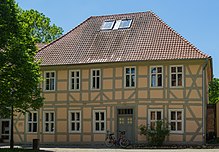Ludolf Parisius
Ludolf Parisius (born October 15, 1827 in Gardelegen , † March 11, 1900 in Berlin ) was a German lawyer, publicist , liberal politician and local researcher .
Life

Ludolf Parisius studied mathematics and law in Halle . There he became a member in 1847 and later an honorary member of the Corps Palaiomarchia . In 1849 he became a member of the Fürstenthal Halle fraternity . He then completed the usual training for the Prussian judicial service. Between 1858 and 1864 he was a district judge in Gardelegen.
From 1859 Parisius was a member of the national association . He took part in the first general assembly of the organization in Coburg . Incidentally, he was a leading politician and journalistic spokesman for the Progress Party . Between 1862 and 1898 Parisius was a member of the Prussian House of Representatives . At first he belonged to the faction of the Progressive Party, later to the Free Party and finally to the Free People's Party .
In 1864 Ludolf Parisius was relieved of his office as judge for political reasons. He then worked as a publicist and author in Berlin . Among other things, in 1865 he was the editor of the papers for cooperatives . He was Hermann Schulze-Delitzsch's deputy at the Association Days of the General German Cooperative Association. Between 1868 and 1872 Parisius was editor of the weekly Der Volksfreund and from 1882 to 1891 he was co-editor of the weekly Der Reichsfreund . In Volksfreund he attacked the reactionary Prussian minister of culture Heinrich von Mühler (1862–1872) in two satires: Ein Pruss. Minister of Education, who has missed his job and (to his reaction) Your Excellency, why so dissatisfied?
From 1874 to 1877 (for the Reichstag constituency Gumbinnen 4 ) and from 1881 to 1887 Parisius was a member of the Reichstag . Between 1877 and 1884 he was editor of the parliamentary correspondence from the Progressive Party alongside Eugen Richter . As a member of the executive committee, he belonged to the narrow leadership group of the Progress Party.
In addition to his political writings, he was also active as a legal author, among other things as a commentator on legislation on the cooperative system. In addition, Parisius tried to preserve the people's good its Altmark home. Several Altmark folk song and history collections come from his hand. Among others, the volumes Im Wald und auf der Heide (1876) and Pictures from the Altmark (1882/1883) are worth mentioning .
In his book Pictures from the Altmark , he uncovered a "judicial murder" in the chapter Grete Minden and the conflagration on September 13, 1617 (p. 66 ff.). In 1880 Theodor Fontane took this case as a template in his novel Grete Minde and presented Grete Minde as the perpetrator.
After Ludolf Parisius' death, Eugen Richter married the surviving widow.
During the GDR era, the Gardelegener Kulturbund bore his name.
Fonts (selection)
- German People's Lexicon. Volume 1: A - arm. Berlin 1869. No more published.
- Additions to JF Danneil's dictionary of the Altmark-Low German dialect. In: Nineteenth annual report of the Altmark Association for Patriotic History and Industry in Salzwedel. History Department. Magdeburg 1879, pp. 37-80
- German folk songs with their ways of singing (sacred songs and ballads), collected in the Altmark and in Magdeburg from Volksmunde. In: Nineteenth annual report of the Altmark Association for Patriotic History and Industry in Salzwedel. History Department. Magdeburg 1879, pp. 113-179
- Pictures from the Altmark . - Hamburg: Richter, 1883. Digitized edition of the University and State Library Düsseldorf
- Leopold Freiherr von Hoverbeck . A contribution to patriotic history. 2 vols. Berlin: J. Guttentag 1897/98
literature
- Helge Dvorak: Biographical Lexicon of the German Burschenschaft. Volume I: Politicians. Volume 8: Supplement L – Z. Winter, Heidelberg 2014, ISBN 978-3-8253-6051-1 , pp. 127–129.
- Ingeborg Weber-Kellermann and Erich Stockmann: Ludolf Parisius and his Altmark folk songs (= German Academy of Sciences in Berlin. Publications of the Institute for German Folklore. Volume 10), Akademie-Verlag, Berlin 1957.
- Gerhard Richter: Two Centenary Letters (From Ludolf Parisius). In: Altmark Museum Stendal. Annual gift XII. 1958, pp. 77-85
- Edwin Nitter: More letters from Ludolf Parisius. In: Altmark Museum Stendal. Annual gift XIII. 1959, pp. 85-101
- Doris Stockmann: The folk song in the Altmark. From the middle of the 19th to the middle of the 20th century (= German Academy of Sciences in Berlin. Publications of the Institute for German Folklore. Volume 29), Akademie-Verlag, Berlin 1962.
Web links
- Literature by and about Ludolf Parisius in the catalog of the German National Library
- Ludolf Parisius in the database of members of the Reichstag
- Biography of the Berlin State Library
- Biography University Library Halle
- Digitization of his main work Pictures from the Altmark
Individual evidence
- ↑ Kösener Corpslisten 1930, 61 , 12
- ↑ Bernhard Mann (arrangement) with the assistance of Martin Doerry , Cornelia Rauh , Thomas Kühne: Biographisches Handbuch für das Prussische Abrafenhaus 1867–1918 (= handbooks on the history of parliamentarism and political parties. Volume 3). Droste, Düsseldorf 1988, ISBN 3-7700-5146-7 , p. 294.
- ^ Otmar Seemann : Incompletely published lexicons and encyclopedias. An addendum to war: MNE. In: Karl H. Pressler (Ed.): From the Antiquariat. Volume 8, 1990 (= Börsenblatt für den Deutschen Buchhandel - Frankfurter Ausgabe. No. 70, August 31, 1990), pp. A 329 - A 334, here: p. A 333.
| personal data | |
|---|---|
| SURNAME | Parisius, Ludolf |
| BRIEF DESCRIPTION | German lawyer, journalist, local historian and politician (DFP), MdR |
| DATE OF BIRTH | October 15, 1827 |
| PLACE OF BIRTH | Guards |
| DATE OF DEATH | March 11, 1900 |
| Place of death | Berlin |